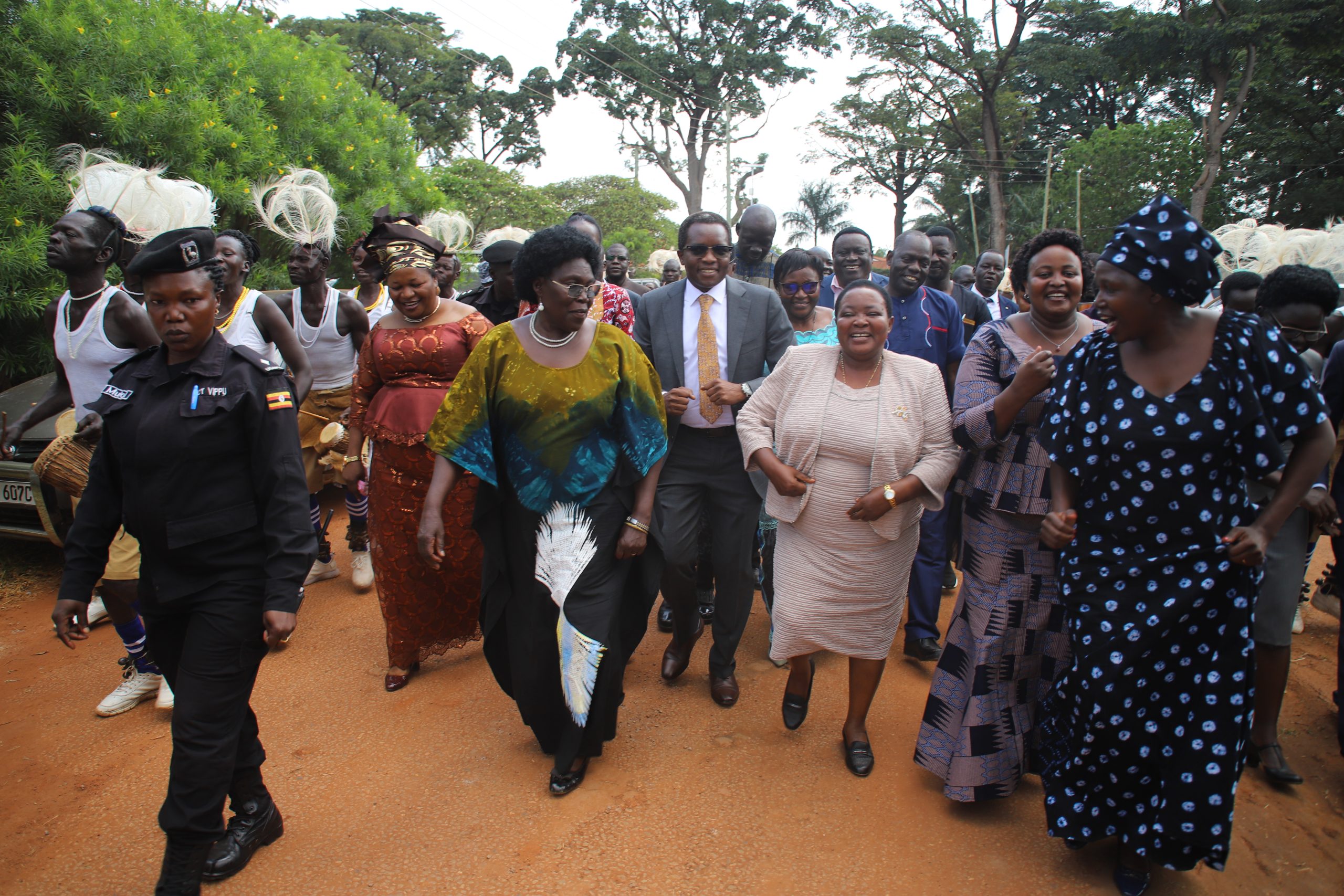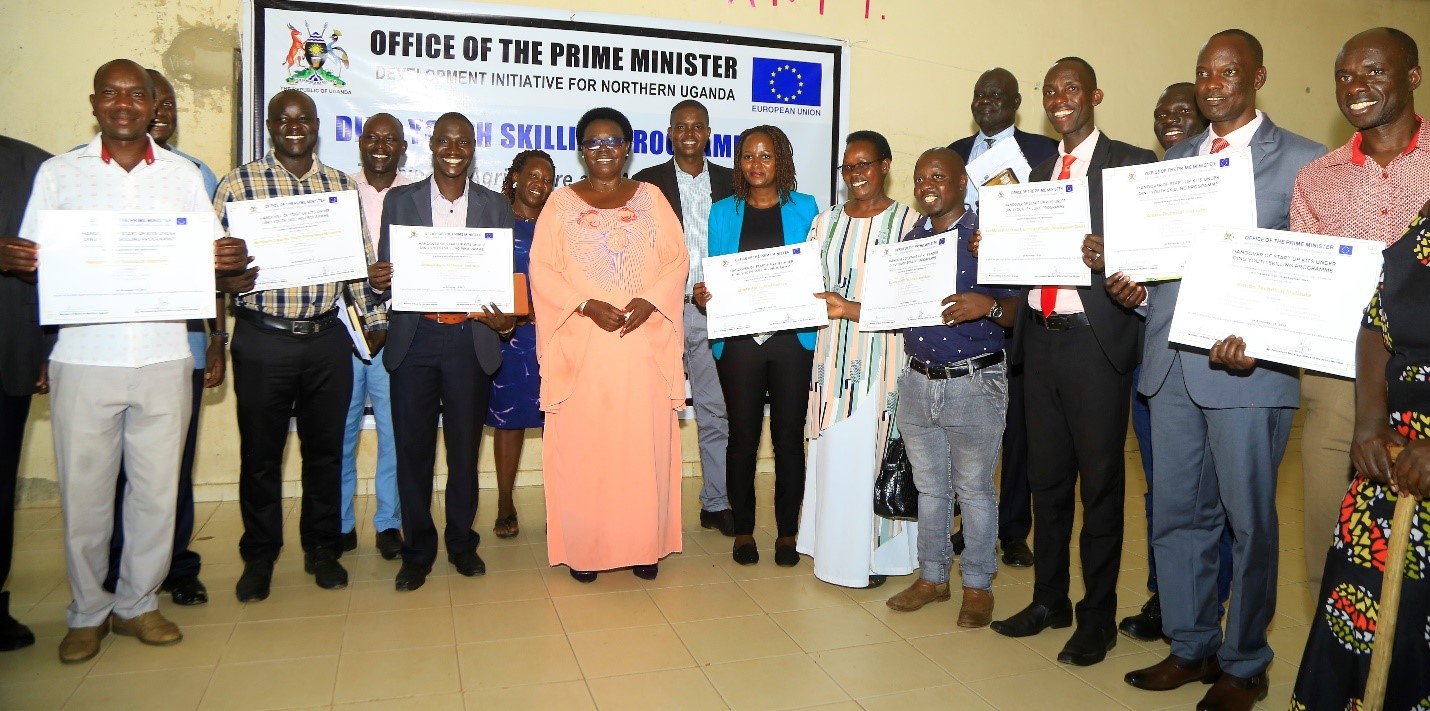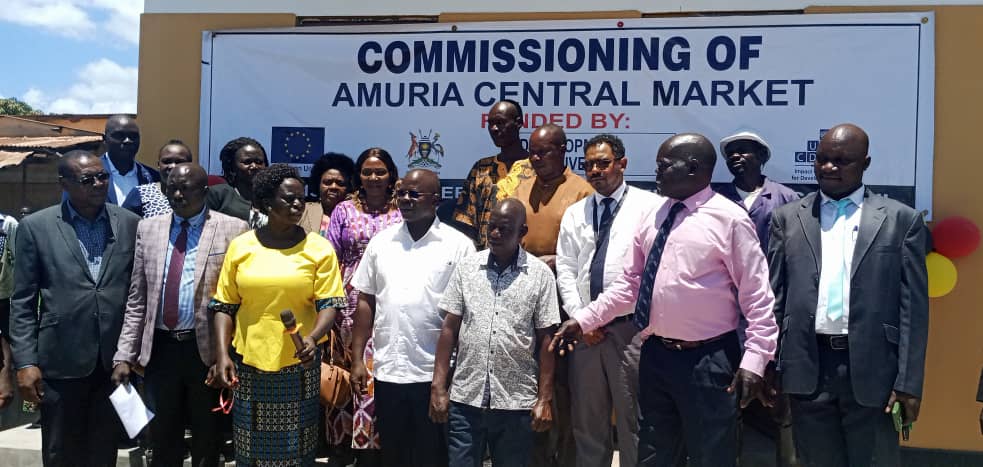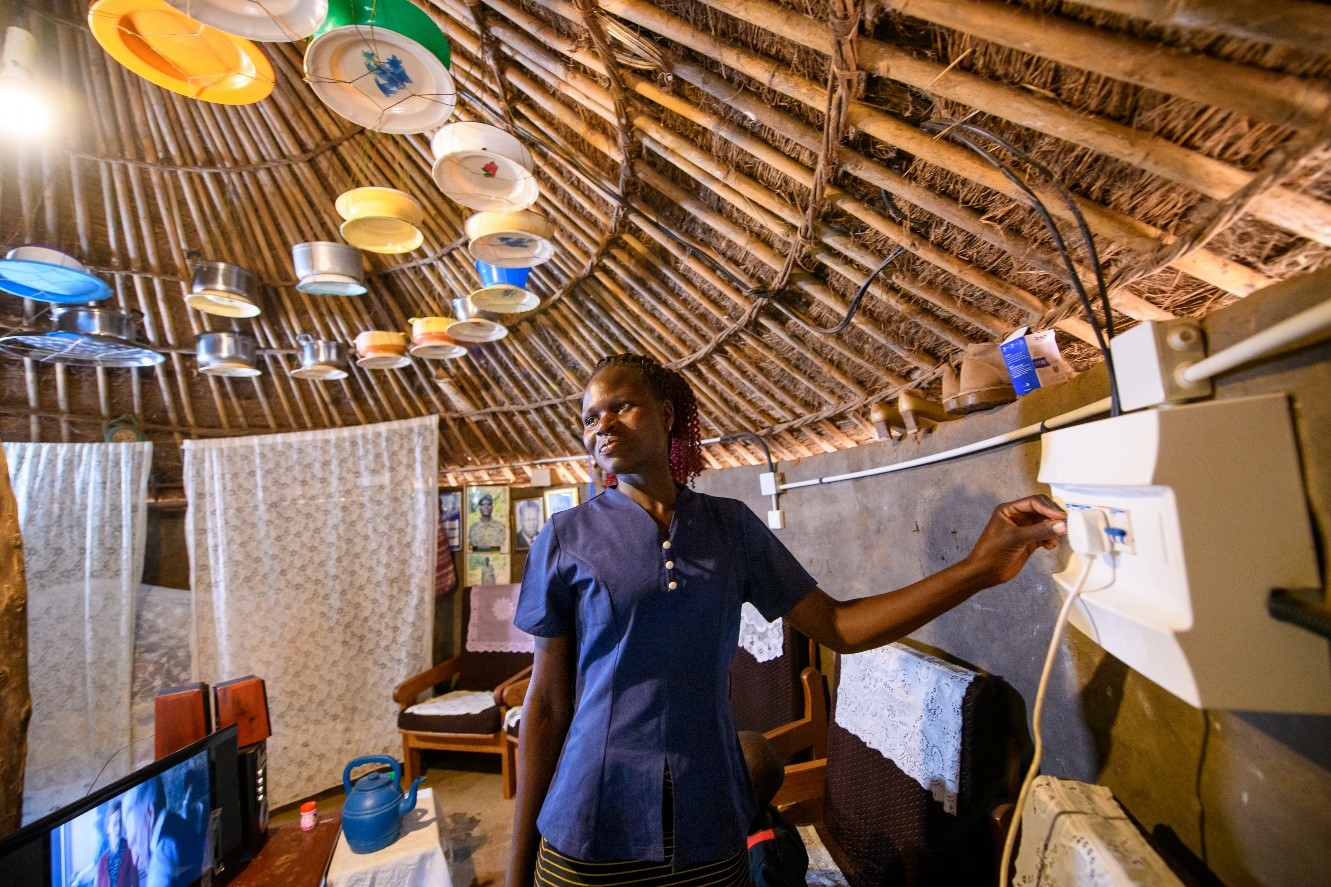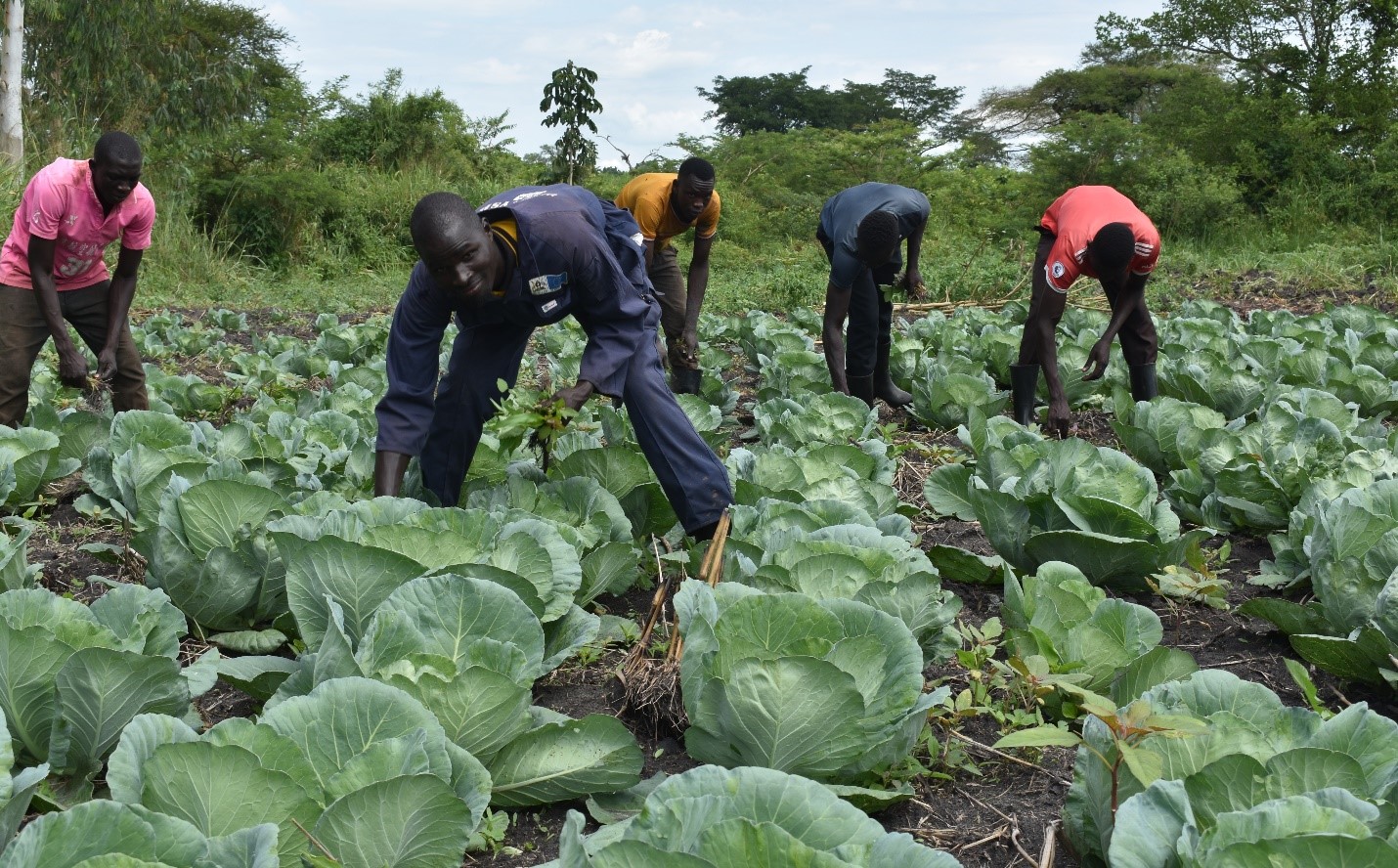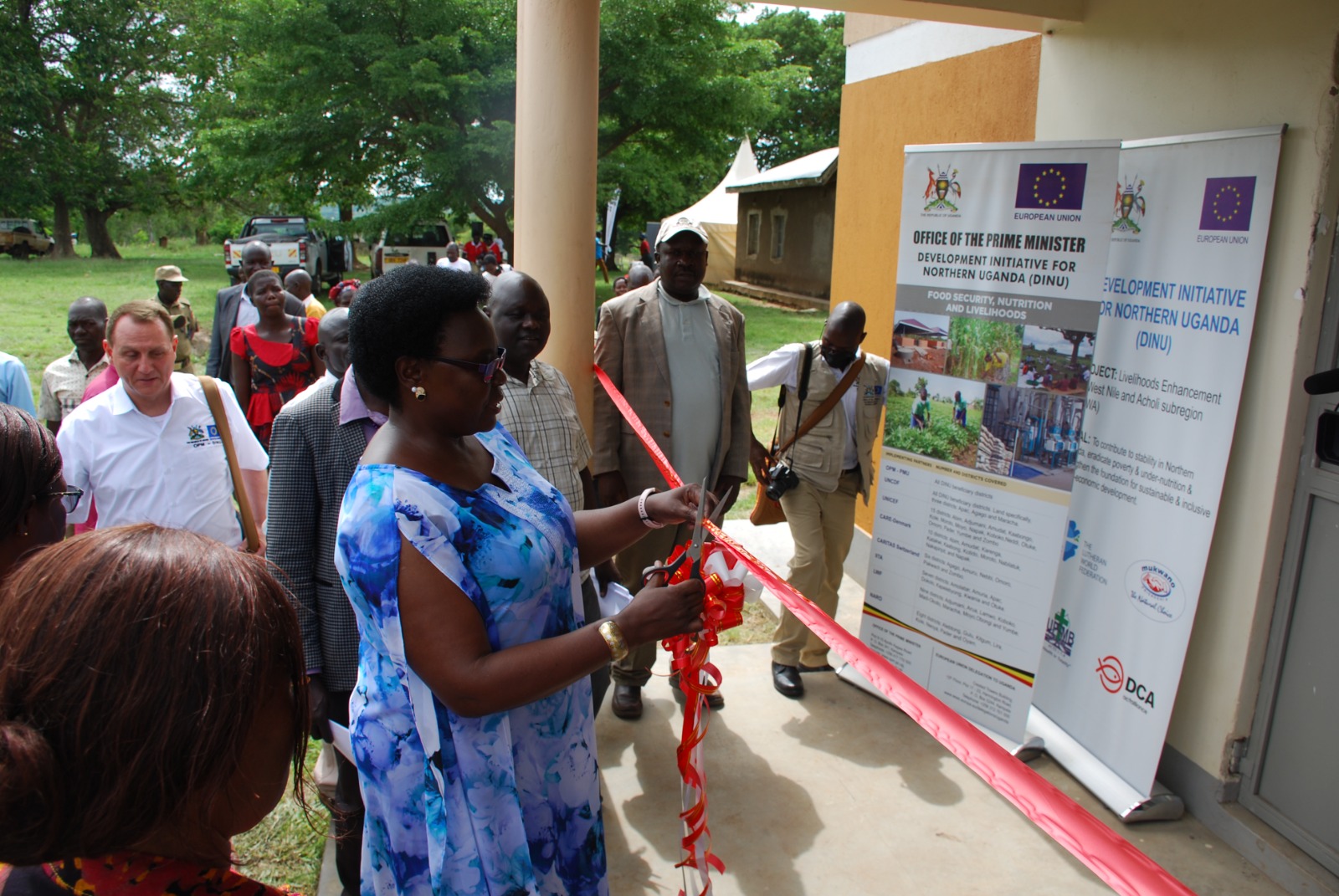BY: CARE TEAM
The Development Initiative for Northern Uganda (DINU), is a Government of Uganda programme supported by the European Union and supervised by Office of the Prime Minister. CARE Denmark is one of the DINU implementing partners. Together with other consortium partners that include Catholic Relief Services, Gulu Agricultural Development Company, Dynamic Argo-Pastoral Development Organization and SORUDA, CARE started implementing a grant action, inclusive market-based development for smallholder farmers in Northern Uganda in 2020 in the 10 districts of Abim, Amudat, Karenga, Katakwi, Kaabong, Kotido, Moroto, Nabilatuk, Nakapiripirit, and Napak. Two years later, the project has started registering tangible results with beneficiaries sharing huge successes: –
From alcoholic to role model man: The story of Adome
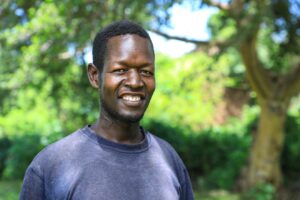
Simon Peter Adome smiles during an interview recently. He credits the DINU intervention for changing his life
Simon Peter Adome, 39, a resident of Nadiket Village, Katirekile Sub-county in Moroto District, spent his youthful life in Moroto without a proper education. With limited mobility and limited opportunities for work, he and other young men resorted to drinking alcohol. To compound matters, he impregnated a teenage girl and started a family at an early stage. When he started his family, he thought that they “belonged” to him; that his wife should do everything for him. After harvesting their crops, he would sell them without telling his wife and spend the money drinking and buying gifts for another woman. “I had all the power to sell anything in the house whenever I wanted, without even asking anyone,” Adome admits.
“I used to think that sending children to school was a waste of resources,” he says. Family planning was something he never wanted to hear about. “Each time my wife would talk about going for family planning services, I would just be rude and cruel to her.” He threatened to divorce her if she continued to bring up the topic. At the time he was excessively drinking alcohol, and the family was living in poverty.
One day, a facilitator from the European Union-funded Development Initiative for Northern Uganda (DINU) programme asked Adome to attend a meeting. “I agreed quickly because I knew they were going to give us a little money after the meeting, which I could use to buy more alcohol. When I reached the venue, I found some men calling themselves Role Model Men talking about gender-based violence, alcohol, etc. They said that it is important for men to help out in gardens with their wives, accompany them to the health centre. I later left when I realized they weren’t going to give us any money.”

Adome tends his garden that he started after the DINU training. He uses proceeds from the garden to save in a VSLA and also pay for his children’s school fees as well as support his family
The facilitator, who had invited him to the meeting, followed up, asking Adome to attend another meeting, but he refused. He persisted and Adome finally agreed. The Role Model Man talked about the various interventions of the DINU project including enrolling to a Village Savings and Loan Association (VSLA), good farming practices, family planning, learning about alcohol and its effects, gender-based violence and parenting. Hesitant about his wife using family planning methods, after several conversations with Adome agreed to go to the Health Centre with his wife for family planning.
“The hardest thing was to abandon alcohol. It took me time to start reducing my level of drinking. It wasn’t easy at first to tell my friends that I used to drink with, and most times, I would find myself going back to them. But with the effort put out by facilitators from DINU, I slowly left the drinking group and even the other woman that I was dating.”
He started regularly accompanying his wife to the Health Centre for family planning. “We agreed together when to have our next child. My children are healthy and have completed their immunizations. My wife has time to participate in other community activities with other women. I am able to pay school fees for my children and provide for their basic needs.”
Adome is a changed man. He can discuss plans for the family with his wife. Together, they jointly decide how to make the best use of their garden harvest and the income they earn from selling crops. He has also joined the Nadiket Farmers Group VSLA where he saves 70% of his farm earnings.
“For every income that I make, I ensure that I present it to my wife and together, we agree on what we should use the money for because she knows a lot more of the needs of our home.”
His wife is very proud of him now, and she has testified to other women how her life has changed and how she is enjoying her home because of how Role Model Men helped her husband and saved their marriage.
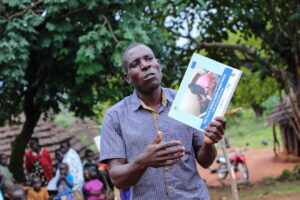
Friday James from Loroyo Village, Karenga Sub-county Karenga District, is a role model man who uses the guide (in his hand)
Beekeeping puts a smile on Moruteket farmers’ faces
Elizabeth Kaneko, 26, is a group leader of the Moruteket Farming Group in Moruteket Village in Abiliyep Parish, Amudat District. Her group, a beneficiary of the DINU programme, was trained by the Amudat District entomologist and supplied with 50 KTB hives in December last year. Forty of these have been colonized and they expect their first harvest next month.
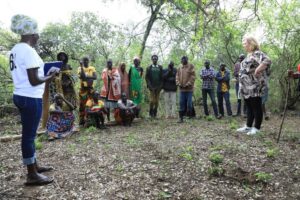
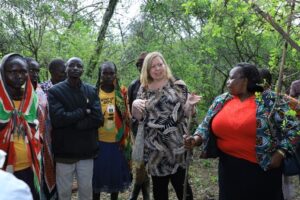
Team from CARE and CRS interact with members of the Moruteket Farming Group. The group noted that thanks to the
DINU interventions, they have been given an alternative to farming, apiary, from which they are earning to sustain their livelihood
To Kaneko, the DINU intervention has been life changing. “We are doing apiary as a business, and not for fun as it was the case before. We are earning as a group and saving 70% of our earnings in our VSLA that was created by CARE International in Uganda and using 30% for consumption. CARE and Catholic Relief Services (CRS) have played a key role in changing social norms which has given women an opportunity to be involved in bee keeping which was previously regarded a taboo.”
The women also have been trained in new techniques of an adapted type of bee-hive by combining good features of the local hive and the KTB hive to produce a “hybrid bee-hive” which is more appropriate for the high temperature in Amudat District.
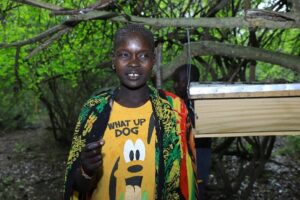
Elizabeth Kaneko speaks during a recent interview. Below is another group member. Kaneko thanked CARE, through DINU, for supporting their efforts to earn
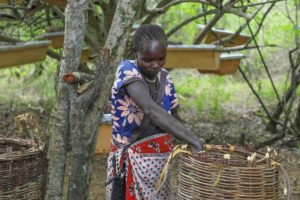
This comes at a time when the DINU project has built a building at the Amudat District headquarters that will house a honey processing facility. The facility, once commissioned, will allow farmers to add value to the honey and earn more money. It will also decrease the farmers’ dependency on the Kenyan market. The district entomologist indicates that they will now engage more apiary value chain players such as Golden Bees, Aridland for off taking products such as empty combs, comb honey and honey wax. The women indicated that they preferred apiary value chain due to the multiplicity of advantages of bees (They get income, the bees pollinate their crops, help them to conserve their trees that they eat as food).
CARE has equally touched more social aspects of the community engaging men and boys as change agents for gender equality and enrolling lead mothers to promote nutrition activities in the farming groups supported. These advocate for gender equality (explains why women in the community are now engaged in apiary) and improve household nutrition by demonstrating and teaching other mothers through their model gardens, respectively. The women reported reduced GBV incidences, as the changed husbands now allow women to engage in productive activities after Role Model Men sensitizing their men.
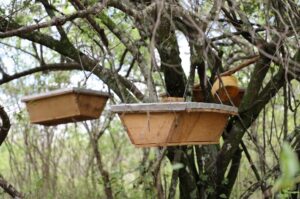
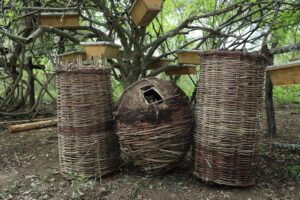
Hang KTB hives displayed by members of the Moruteket Farming Group in Amudat.
The group received 50 KTB hives, 40 of whom have been colonized and await harvest in June this year
From warrior to vegetable farmer
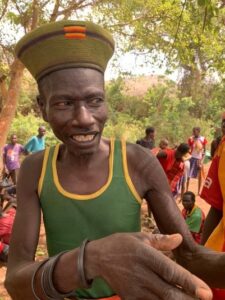
Nangiro (former pastoralist) explains the benefits of vegetable growing in Nadiket Village, Musase Parish in Moroto District
Karamoja Sub-region in northeastern Uganda has a legacy of violent pastoralists conflicts associated with decades of cattle rustling, which has caused immeasurable suffering for the people, especially the women and girls. Many women are widowed and others raped and even killed as they travel long distances in search of water, firewood, charcoal, and food.
Phillip Nangiro, a retired warrior from Nadiket Village, Musase Parish, Katikekile Sub-County, Moroto District was a pastoralist since his childhood. He has always enjoyed taking care of his animals (45 cows, 100+ goats) as he benefited a lot in terms of improved nutrition and income from the animals.
“Pastoralism is my way of life”, Nangiro says. “I used to graze my animals at the slopes of Mount Moroto, and life has always been good. In times of hardships, I would just pick a cow or a goat and sell to buy food for the family and other necessities, but now since my animals were taken by raiders, things have never been the same again”.
Nangiro acknowledges that life is now immensely very hard since he no longer has animals.
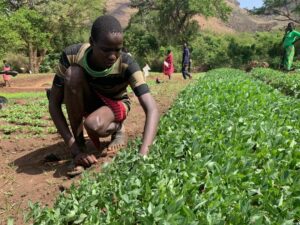
Nangiro at his vegetable garden in Nadiket Village, Musase Parish, Katikekile Sub- county in Moroto District
“I got hope when my neighbour who was in Nadiket Farmers Group supported by DINU, within my village made me realize the benefits from vegetable production. This touched me and he finally introduced me to vegetable production. Right now I have harvested from my three cowpeas beds and was able to get UGX 128,000. This has made life quite easy. I was even able to convince three of my friends who were not part of the group to join and right now they are also benefiting from vegetable production. I intend to expand my vegetable gardens and if possible join the farmer groups to be able to benefit further in other group interventions like saving and other social aspects.”
is one of the more than 68,250 (60% women) smallholder farmer households in Moroto, Katakwi, and Kitgum districts who DINU has helped increase their food security, maternal and child nutrition, and enhanced their household incomes through Village Savings and Loans Associations (VSLAs).
DINU’s multiplier effect
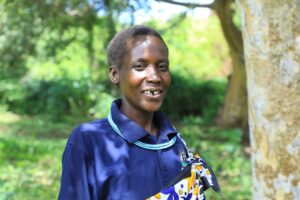
Angelina Namadek credits her success to DINU. From being a casual labourer to employer on her farm.
She says DINU has greatly helped increase her harvests and savings in the VSLA
When you are living on a dollar or less a day, one intervention or even two simply aren’t enough to make a lasting impact. To escape chronic poverty, you need to be able to change your life in many ways that build on each other over time. Take, for instance, Angelina Namadek, a 40-year-old mother of five from Nadiket Village, Katirekile Sub-county, Moroto District.
“Before DINU, I was leading a very difficult life. I lost my mother when I was eight years old then my brother who was taking care of me passed away six years later,” Angelina shares.
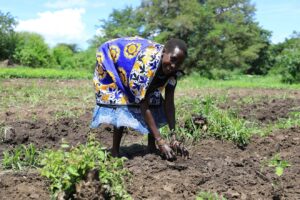
Namadek takes time off to plant in her garden. Harvests have increased over years and she since opened up a bank account where she saves this money that help pay for utilities and home and her children’s school fees
She began to care for her brother’s two children in addition to her own child. Angelina couldn’t stay in school and had to become a casual labourer, weeding and doing farm work in other people’s fields. However, that could not make ends meet for her family that had grown to five children. Her husband was equally not helping a lot. She sought an alternative source of income, braving the thorny savannah shrubs on the slopes of Mount Moroto to collect logs that she would burn, and make charcoal for sale.
In August 2020, Namadek attended a community meeting where she learned about the various DINU activities funded by the European Union coming to her village. The one that interested her most was the improved farming techniques and the Village Savings and Loans Associations (VSL) groups.
Instead of having to take out loans at high interest rates from banks that came with a need for collateral, community members could form a group to pool their savings in order to extend lower interest loans to each other. These loans allowed members to start small businesses to earn a quick profit. “I was interested in VSLA because everyone needs money,” she explains with a smile. The community selected her to receive DINU training to help other members form VSLAs in her area. She was equally trained in row cropping, and advised to ditch cutting forest cover because it would contribute to droughts, which is already an issue in the area.
“My life started to change, and my worries began to decrease,” She says. “I stopped broadcasting, and planted the soybeans issued to me by DINU in a row. This allowed me to easily weed my garden, and the spacing gave me high yields. Because of the high yields, I was able to save money from my harvest sales into our VSLA, and use the balance to provide for my children’s school fees and other home necessities. The garden is providing a balanced diet for my family, and I have completely stopped cutting down trees because my gardens earn me a proper living, and I know that my garden needs the trees for rainfall. Equally, the money I get from my VSLA, I invest in my field, and I use that harvest for food and for sale. And in the support group, we learn about nutrition, so I then grow some vegetables or buy additional nutritious foods. I’ve also opened savings accounts for my children at the local bank to make sure they have the money needed for school,” she explains.
Namadek is no longer struggling but is a respected community leader. “I am a different person from before I joined the DINU program. I’m leading a happy life because I have enough food for me and my children,” she says. “And now casual laborers are working in my garden, and I pay them.”
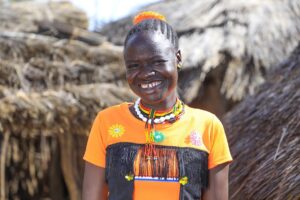
Maria Lokure is a lead mother from Likitela Villa, Kotido District, and her farmers group has achieved immerse success through the DINU interventions
Maria Lokure of Lokitela Village, LokitalebuSub-County, Kotido District is another beneficiary. She was initially skeptical about the benefits of crop growing coming from a heavily reliant community on pastoralism. Her husband was equally not helping. He kept discouraging her from trainings that had been set out by agricultural extension officers in her village.
But things changed when the Village Savings and Loans Association (VSLA) component was integrated. She saw this as an opportunity to find a way to rid her family of poverty.
“At the training, we were urged to form a savings group, and we were advised that farming was one way we would sustain it,” Lokure says.
“As the trainings went on, I felt attached to try out farming. My husband and I owned about 04 acres of land at the time and I saw it was a big opportunity to grow crops.” In her Kalothupa Farmers Group, Lokure, who has since been identified as a lead mother, and other 27 women were trained in climate-smart agriculture. They were taught to stop broadcasting seeds and instead plant crops in rows. At the end of the trainings, the group was given 30 kilograms of foundation soybean seeds. “We went back, opened our lands and planted the soybeans as we had been instructed. After three months, we were able to harvest 200 kilograms,” says Lokure as her face beaming with pride. “That was unexpected! If you had told me this would happen six months ago, I would have laughed at you; but thanks to the DINU project, it was real – I am very happy.”
Buoyed by their harvest, Lokure and team have since opened up eight acres of land where they have planted 150 kilograms of soybean seeds and hope to harvest 700 kilograms.
“We are sure that our next harvest will be very good. We have planted as trained and are being role models in our community. Our VSLA is functional, we are saving and getting loans to better our families – and, my husband is very happy with the work I am doing. He has since given me and my group access to all his land to cultivate and grow soybeans on a large scale. DINU has indeed changed my life, and that of my family and friends,” she says.
